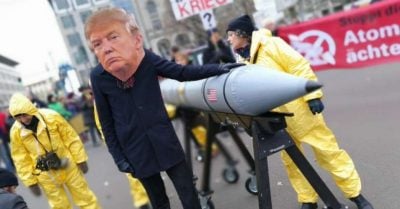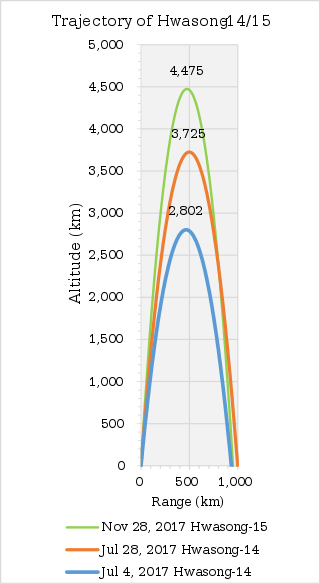Dangerous Crossroads: In Response to US Nuclear Blackmail, North Korea is ‘Begging for Peace’: Expert
"US military action against North Korea should be considered illegal under international law," U.S. Lawyer Azadeh Shahshahani told teleSUR.

The risk of war between the United States and North Korea is “increasing every day”, U.S. National Security Adviser Herbert Raymond McMaster has said, adding that North Korean leader Kim Jong-un is working to advance his country’s nuclear capability against the United States.
“The greatest immediate threat to the United States and to the world is the threat posed by the rogue regime in North Korea, and his continued efforts to develop a long range nuclear capability,” McMaster told Fox News Saturday, after Pyongyang’s launch of an intercontinental ballistic missile last November 29.
This missile test, North Korea’s first since mid-September, came after Pyongyang had denounced Trump’s decision to relist it as a State sponsor of terrorism, calling it a “serious provocation and violent infringement.” Kim Jong-un claimed it as a “breakthrough” that will allow it to strike the mainland United States.
“After watching the successful launch of the new type ICBM Hwasong-15, Kim Jong-un declared with pride that now we have finally realized the great historic cause of completing the state nuclear force, the cause of building a rocket power,” a statement read on state television said.
In the statement, North Korea described itself as a “responsible nuclear power,” saying its strategic weapons were developed to defend itself from “the U.S. imperialists’ nuclear blackmail policy, and nuclear threat”.
President Trump has said repeatedly that all options, including military ones, are on the table in dealing with North Korea, and has traded insults and threats with Kim. In September, the U.S. president said that Washington would have no choice but to “totally destroy” North Korea if forced to defend itself or its allies.
North Korean state media has repeatedly called President Trump an “old lunatic,” as the American leader called Kim Jong-un “a sick puppy” last week.
On Nov. 30, U.S. Ambassador to the UN Nikki Haley, said that the regime in Pyongyang would be “utterly destroyed,” if war were to break out in the wake of the latest ballistic missile test by Pyongyang.
“We have never sought war with North Korea, and still… we do not seek it,” Nikki Haley said.
“If war does come, it will be because of continued acts of aggression like we witnessed… And if war comes, make no mistake, the North Korean regime will be utterly destroyed. No one can doubt that this threat is growing.”
The UN ambassador also called on all nations to “cut ties” with North Korea.
“Yesterday the North Korean regime made a choice. It chose to feed its nuclear aggression” and to “thumb its nose” at the world, she said.
The Finnish Professor of International Relations Timo Kivimäki, Director of Research at the University of Bath in England, told teleSUR that
“while Ambassador Haley feels that North Korea is begging for a war, and that it is blackmailing the region with nuclear weapons, North Korea can, actually, be begging for peace. It may be building a nuclear deterrent to react to what it sees as U.S. nuclear blackmail.”
“The North Korean situation is very dangerous. We’ve got to irresponsible, impulsive, reckless, bullying, threatening leaders with access to nuclear weapons. They’re playing an apocalyptic game of chicken,” pointed out to teleSUR the American nuclear expert, Peter Kuznick.
“Both keep escalating the rhetoric and the provocations. This might end very, very badly. Neither wants to back down and look weak. They both base their reputations on being strong and always winning, regardless of the costs or how much suffering they cause”.
President Trump has repeatedly and openly dismissed efforts to start talks with North Korea. In early October, he said that Secretary of State Rex Tillerson was “wasting his time trying to negotiate with Little Rocket Man [Kim Jong-un]” in putting out feelers for negotiations with Pyongyang.
On Oct. 9, Defence Secretary James Mattis declared that the armed forces had “to be ready to ensure that we have military options that our president can employ if needed.”
During a Moscow conference dedicated to peace on the Korean peninsula, and the future reunification of its two states on Sept. 30, North Korean Ambassador to Russia Kim Yong-jae said:
“If the U.S. behaves in ways that deny our state’s right to exist, our republic, as our supreme leader Kim Jong-un has said, will make them pay in full by the just power of our nuclear arsenal.”
Prof. Dr. Kivimäki said that
“only with dialogue can both sides see that what both see as nuclear blackmail, could actually be just deterrence.”
“Unfortunately, it seems, North Korean leader has been unable to understand that his provocative moves not only deter, but also provoke, and instead of provocations, both North Korea and the US should focus on dialogue, so that the core interests of both countries could be secured.”

Lofted trajectories of Hwasong-14 and Hwasong-15 (Source: Wikimedia Commons)
In mid-October, the USS Ronald Reagan aircraft carrier along with a guided-missile cruiser, nearly 80 aircraft on board and a nuclear-powered submarine, arrived in the Korean Peninsula to prepare for a potential war with North Korea.
Since then, US and South Korea are conducting joint drills to detect, track, and intercept ballistic missiles, in addition to anti-submarine warfare training.
Prof. Dr. Kuznick said that the world lives under a deep uncertainty.
“We know what the ultimate solution will have to be. The world will have to accept North Korea as a nuclear weapons state, as odious as that prospect might be,” the expert said, adding that a peace treaty ending the Korean War is fundamental, as both parties has signed an armistice agreement at the end of the war on July 27, 1953.
“The U.S. will have to reduce its military presence and training exercises in South Korea and stop threatening regime change. It may have to also ease its sanctions,” the Director of Nuclear Studies at the American University added. “North Korea will have to halt its missile and nuclear weapons tests and freeze its programs. It will have to stop making threats. This is what we call the ‘freeze for freeze’ option.
“Something like that was in place between 1994 and 2002 and it was largely successful though neither side fully met its responsibilities. It can work again. But it doesn’t look like Trump and Kim are capable of working this out.
“Therefore other international leaders will have to take the initiative. I hope this happens quickly because the situation gets more dangerous by the day. And this is the closest we’ve come to nuclear war since the Cuban Missile Crisis, with the possible exception of the dangerous standoff between India and Pakistan in 2001 and 2002, another crisis that continues to fester,” observed Prof. Dr. Kuznick.
U.S. human rights attorney Azadeh Shahshahani, Legal and Advocacy Director of Project South and past president of the National Lawyers Guild, spoke to teleSUR considering that Washington has no right to a preemptive attack against North Korea.
“From a legal point of view, the launch of a military attack against North Korea will be very problematic,” she pointed out.
“The U.N. Charter only allows the use of military force by states for self defense or when there is collective action by the UN Security Council. Neither of these pre-requisites are met here. As a result, US military action against North Korea under current conditions should be considered illegal under international law.”
U.S. Historian Kuznick observed that North Koreans would rather “eat grass” than give up their nuclear weapons, as Russian President Vladimir has said.
“They feel under attack from the United States. They vividly remember what the U.S. did to them in the Korean War, when the U.S. burned down every city in both North and South Korea.”
“The U.S. dropped four times as many bombs on Korea as it did against Japan in World War II. They know that the Korean War never officially ended.”
Prof. Dr. Kivimäki pointed out to the same direction, reminding that North Korea’s foreign minister Ri Yong Ho claimed in his paper at the ASEAN Regional Forum on August 7, that
“North Korea’s fear is rational. given that the U.S. has actually used nuclear weapons against civilians, that it has placed nuclear weapons on the Korean Peninsula, that it keeps on practicing war operations that simulate regime change, that it has changed regimes in several authoritarian non-nuclear countries and that it has refused the commitment to non-use of nuclear weapons against countries with no nuclear weapons.”
“None of this can be read from the world media,” stated the Finnish researcher.
Concluding his analysis, International Relations expert Kivimäki considered that Pyongyang’s fear is not irrational, given that president Nixon actually once gave an order for a nuclear attack against North Korea.
“The CIA’s top Vietnam specialist, George Carver, reportedly said that in 1969, when the North Koreans shot down a U.S. spy plane, ‘Nixon became incensed and ordered a tactical nuclear strike.’
“Someone has said that Nixon was like Trump but without the Twitter. Trump, again, was like Nixon, but without Kissinger. Hopefully, the obvious conclusion is not a nuclear strike against North Korea.”
On the other hand, Prof. Kuznick warned, deeply concerned:
“we don’t know what to expect. These situations can not be allowed to turn into nuclear holocausts, from which our species and our planet may never recover.”

